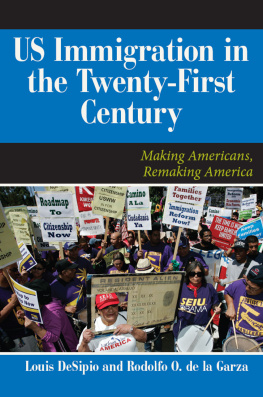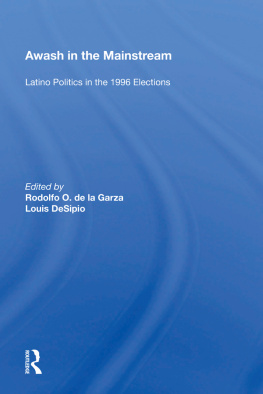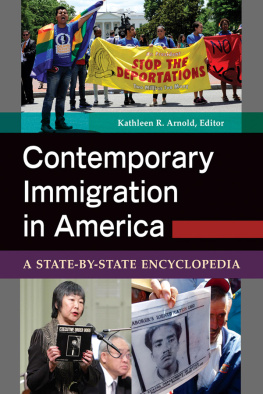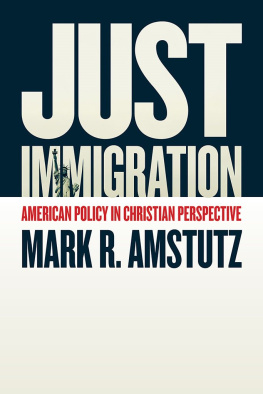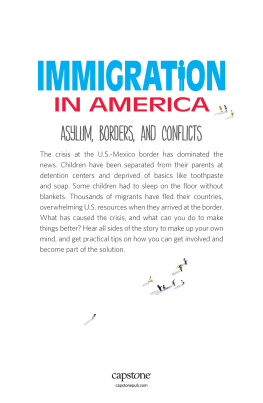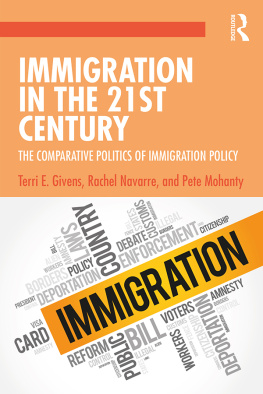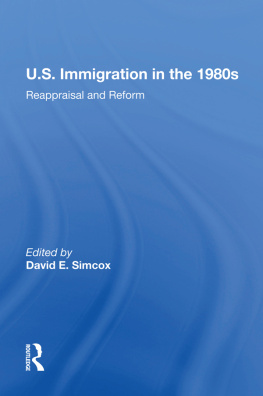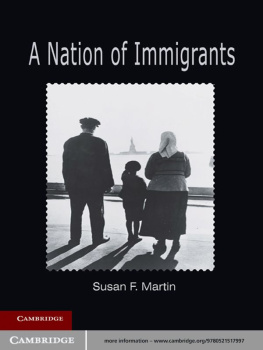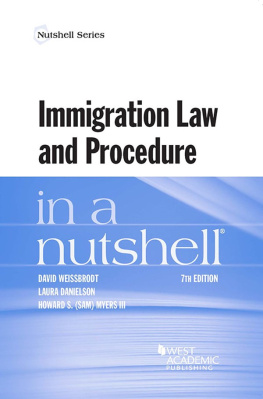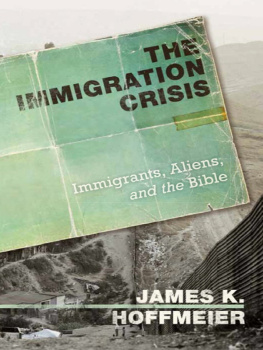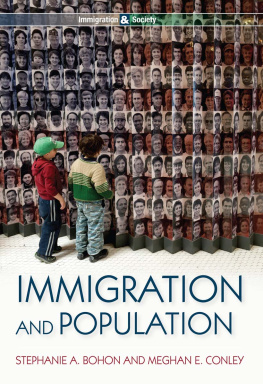US Immigration in the Twenty-First Century
Making Americans, Remaking America
Dilemmas in American Politics
Series Editor: Craig A. Rimmerman,Hobart and William Smith Colleges
If the answers to the problems facing U.S. democracy were easy, politicians would solve them, accept credit, and move on. But certain dilemmas have confronted the American political system continuously. They defy solution; they are endemic to the system. Some can best be described as institutional dilemmas: How can the Congress be both a representative body and a national decision-maker? How can the president communicate with more than 250 million citizens effectively? Why do we have a two-party system when many voters are disappointed with the choices presented to them? Others are policy dilemmas: How do we find compromises on issues that defy compromise, such as abortion policy? How do we incorporate racial and ethnic minorities or immigrant groups into American society, allowing them to reap the benefits of this land without losing their identity? How do we fund health care for our poorest or oldest citizens?
Dilemmas such as these are what propel students toward an interest in the study of U.S. government. Each book in the Dilemmas in American Politics Series addresses a real world problem, raising the issues that are of most concern to students. Each is structured to cover the historical and theoretical aspects of the dilemma but also to explore the dilemma from a practical point of view and to speculate about the future. The books are designed as supplements to introductory courses in American politics or as case studies to be used in upper-level courses. The link among them is the desire to make the real issues confronting the political world come alive in students eyes.
EDITORIAL BOARD
Amy Black
Wheaton College
MaryAnne Borrelli
Connecticut College
Diana Evans
Trinity College
William Hudson
Providence College
Ruth Jones
Arizona State University
Josiah Lambert
St. Bonaventure University
Jay McCann
Purdue University
Barbara Norrander
University of Arizona
Karen OConnor
American University
Richard Pacelle
Georgia Southern University
Ellen Riggle
University of Kentucky
BOOKS IN THIS SERIES
US Immigration in the Twenty-First Century: Making Americans, Remaking America
Louis DeSipio and Rodolfo O. de la Garza
Inequality in America: Race, Poverty, and Fulfilling Democracys Promise
Stephen M. Caliendo
The Lesbian and Gay Movements: Assimilation or Liberation?, Second Edition
Craig A. Rimmerman
Can We All Get Along?: Racial and Ethnic Minorities in American Politics, Sixth Edition
Paula D. McClain and Joseph Stewart Jr.
The Democratic Dilemma of American Education: Out of Many, One?
Arnold Shober
Onward Christian Soldiers? The Religious Right in American Politics, Fourth Edition
Clyde Wilcox and Carin Larson
The New Citizenship: Unconventional Politics, Activism, and Service, Fourth Edition
Craig A. Rimmerman
Voting for Women: How the Public Evaluates Women Candidates
Kathleen A. Dolan
Two Partiesor More? The American Party System, Second Edition
John F. Bibby and L. Sandy Maisel
The Role of the Supreme Court in American Politics: The Least Dangerous Branch?
Richard L. Pacelle Jr.
Money Rules: Financing Elections in America
Anthony Gierzynski
The Accidental System: Health Care Policy in America
Michael D. Reagan
The Image-Is-Everything Presidency: Dilemmas in American Leadership
Richard W. Waterman, Robert Wright, and Gilbert St. Clair
The Angry American: How Voter Rage Is Changing the Nation, Second Edition
Susan J. Tolchin
Remote and Controlled: Media Politics in a Cynical Age, Second Edition
Matthew Robert Kerbel
From Rhetoric to Reform? Welfare Policy in American Politics
Anne Marie Cammisa
Payment Due: A Nation in Debt, a Generation in Trouble
Timothy J. Penny and Steven E. Schier
Bucking the Deficit: Economic Policymaking in the United States
G. Calvin Mackenzie and Saranna Thornton
First published 2015 by Westview Press
Published 2018 by Routledge
711 Third Avenue, New York, NY 10017, USA
2 Park Square, Milton Park, Abingdon, Oxon OX14 4RN
Routledge is an imprint of the Taylor & Francis Group, an informa business
Copyright 2015 Taylor & Francis
All rights reserved. No part of this book may be reprinted or reproduced or utilised in any form or by any electronic, mechanical, or other means, now known or hereafter invented, including photocopying and recording, or in any information storage or retrieval system, without permission in writing from the publishers.
Notice:
Product or corporate names may be trademarks or registered trademarks, and are used only for identification and explanation without intent to infringe.
Every effort has been made to secure required permissions for all text, images, maps, and other art reprinted in this volume.
Designed by Jack Lenzo and Cynthia Young
A CIP catalog record for the print version of this book is available from the Library of Congress.
LCCN: 2014954088
ISBN 13: 978-0-8133-4473-7 (pbk)
To our families immigrant heritage
Luigi Ricca, great-grandfather
Clara Richieda, great-grandmother
Gioachino DeSipio, grandfather
Italians by birth
Laurence Walton, great-great-great-great-grandfather
English by birth
Sofia Oropeza, mother
Mexican by birth
Adelaida Traveria, mother-in-law
Serafin Corbelle, father-in-law
Ileana Corbelle, wife
Cubans by birth
and others unknown
Americans by choice
AS WE BEGAN THIS PROJECT, WE ANTICIPATED THAT WE WOULD be writing a somewhat different book. The nation is long overdue for a major reform to its immigration policies, and the outline of what a new system could look like has been clear for nearly a decade. With these conditions in place, our expectation was that Congress and the executive branch would find the compromises necessary to craft a major, comprehensive immigration reform bill, and that our study of immigration and immigrant incorporation policy would conclude with an assessment of this new piece of legislation itself, as well as a study of the political and policy calculus that allowed the necessary compromises to be achieved.
We were wrong. Instead, Congress has not been able to agree on a new direction for US immigration in the twenty-first century, and it is increasingly likely that Congress will remain in the current legislative stalemate at least into the early 2020s. For the past fifteen years, Congress (particularly the US Senate) and the two most recent presidentsRepublican George W. Bush and Democrat Barack Obamahave actively debated immigration policy and have identified a bipartisan set of changes and reforms to the current immigration law. However, no bill has been sent to either president for his review and signature. With the exception of added border and interior enforcement measures, Congress has been unable to pass even narrow immigration legislation. Left unaddressed are the needs of highly organized segments of US society, such as the business community, which claims it cannot meet its labor needs under the current system, or the needs of segments of the unauthorized immigrant community, such as the young adults who entered the United States unauthorized as children and subsequently went on to succeed in US society, and who have a compelling claim to legal status.

